 Tìm kiếm
Tìm kiếm
Chương IV Luật giáo dục 2019: Nhà giáo
| Số hiệu: | 43/2019/QH14 | Loại văn bản: | Luật |
| Nơi ban hành: | Quốc hội | Người ký: | Nguyễn Thị Kim Ngân |
| Ngày ban hành: | 14/06/2019 | Ngày hiệu lực: | 01/07/2020 |
| Ngày công báo: | 20/07/2019 | Số công báo: | Từ số 569 đến số 570 |
| Lĩnh vực: | Giáo dục | Tình trạng: | Còn hiệu lực |
TÓM TẮT VĂN BẢN
Văn bản tiếng việt
Văn bản tiếng anh
1. Nhà giáo làm nhiệm vụ giảng dạy, giáo dục trong cơ sở giáo dục, trừ cơ sở giáo dục quy định tại điểm c khoản 1 Điều 65 của Luật này.
Nhà giáo giảng dạy ở cơ sở giáo dục mầm non, giáo dục phổ thông, cơ sở giáo dục khác, giảng dạy trình độ sơ cấp, trung cấp gọi là giáo viên; nhà giáo giảng dạy từ trình độ cao đẳng trở lên gọi là giảng viên.
2. Nhà giáo có vai trò quyết định trong việc bảo đảm chất lượng giáo dục, có vị thế quan trọng trong xã hội, được xã hội tôn vinh.
Nhà giáo phải đáp ứng các tiêu chuẩn sau đây:
1. Có phẩm chất, tư tưởng, đạo đức tốt;
2. Đáp ứng chuẩn nghề nghiệp theo vị trí việc làm;
3. Có kỹ năng cập nhật, nâng cao năng lực chuyên môn, nghiệp vụ;
4. Bảo đảm sức khỏe theo yêu cầu nghề nghiệp.
1. Giáo sư, phó giáo sư là chức danh của nhà giáo đang giảng dạy, nghiên cứu khoa học ở cơ sở giáo dục đại học đáp ứng tiêu chuẩn giáo sư, phó giáo sư do cơ sở giáo dục đại học bổ nhiệm.
2. Thủ tướng Chính phủ quy định tiêu chuẩn, thủ tục bổ nhiệm, miễn nhiệm chức danh giáo sư, phó giáo sư.
1. Giảng dạy, giáo dục theo mục tiêu, nguyên lý giáo dục, thực hiện đầy đủ và có chất lượng chương trình giáo dục.
2. Gương mẫu thực hiện nghĩa vụ công dân, điều lệ nhà trường, quy tắc ứng xử của nhà giáo.
3. Giữ gìn phẩm chất, uy tín, danh dự của nhà giáo; tôn trọng, đối xử công bằng với người học; bảo vệ các quyền, lợi ích chính đáng của người học.
4. Học tập, rèn luyện để nâng cao phẩm chất đạo đức, trình độ chính trị, chuyên môn, nghiệp vụ, đổi mới phương pháp giảng dạy, nêu gương tốt cho người học.
1. Được giảng dạy theo chuyên môn đào tạo.
2. Được đào tạo, bồi dưỡng nâng cao trình độ chính trị, chuyên môn, nghiệp vụ.
3. Được hợp đồng thỉnh giảng, nghiên cứu khoa học tại cơ sở giáo dục khác hoặc cơ sở nghiên cứu khoa học.
4. Được tôn trọng, bảo vệ nhân phẩm, danh dự và thân thể.
5. Được nghỉ hè theo quy định của Chính phủ và các ngày nghỉ khác theo quy định của pháp luật.
1. Thỉnh giảng là việc cơ sở giáo dục mời người đủ tiêu chuẩn quy định tại Điều 67 của Luật này đến giảng dạy. Người được cơ sở giáo dục mời giảng dạy được gọi là giáo viên thỉnh giảng hoặc giảng viên thỉnh giảng.
2. Giáo viên, giảng viên thỉnh giảng phải thực hiện nhiệm vụ quy định tại Điều 69 của Luật này. Giáo viên, giảng viên thỉnh giảng là cán bộ, công chức, viên chức phải bảo đảm hoàn thành nhiệm vụ nơi mình công tác.
3. Khuyến khích việc mời nhà giáo, nhà khoa học trong nước, nhà khoa học là người Việt Nam định cư ở nước ngoài và người nước ngoài đến giảng dạy tại cơ sở giáo dục theo chế độ thỉnh giảng.
1. Trình độ chuẩn được đào tạo của nhà giáo được quy định như sau:
a) Có bằng tốt nghiệp cao đẳng sư phạm trở lên đối với giáo viên mầm non;
b) Có bằng cử nhân thuộc ngành đào tạo giáo viên trở lên đối với giáo viên tiểu học, trung học cơ sở, trung học phổ thông.
Trường hợp môn học chưa đủ giáo viên có bằng cử nhân thuộc ngành đào tạo giáo viên thì phải có bằng cử nhân chuyên ngành phù hợp và có chứng chỉ bồi dưỡng nghiệp vụ sư phạm;
c) Có bằng thạc sĩ đối với nhà giáo giảng dạy trình độ đại học; có bằng tiến sĩ đối với nhà giáo giảng dạy, hướng dẫn luận văn thạc sĩ, luận án tiến sĩ;
d) Trình độ chuẩn được đào tạo của nhà giáo giảng dạy trong cơ sở giáo dục nghề nghiệp thực hiện theo quy định của Luật Giáo dục nghề nghiệp.
2. Chính phủ quy định lộ trình thực hiện nâng trình độ chuẩn được đào tạo của giáo viên mầm non, tiểu học, trung học cơ sở quy định tại điểm a và điểm b khoản 1 Điều này. Bộ trưởng Bộ Giáo dục và Đào tạo, Bộ trưởng Bộ Lao động - Thương binh và Xã hội, trong phạm vi nhiệm vụ, quyền hạn của mình, quy định việc sử dụng nhà giáo trong trường hợp không đáp ứng quy định tại khoản 1 Điều này.
1. Nhà nước có chính sách đào tạo, bồi dưỡng để nâng cao trình độ chính trị, chuyên môn, nghiệp vụ cho nhà giáo; nhà giáo được cử đi đào tạo, bồi dưỡng được hưởng lương và phụ cấp theo quy định của Chính phủ.
2. Cơ sở giáo dục có trách nhiệm tạo điều kiện để nhà giáo được đào tạo, bồi dưỡng đạt chuẩn theo quy định của pháp luật.
1. Cơ sở giáo dục thực hiện nhiệm vụ đào tạo, bồi dưỡng nhà giáo gồm trường sư phạm, cơ sở giáo dục có khoa sư phạm, cơ sở giáo dục được phép đào tạo, bồi dưỡng nhà giáo.
2. Cơ sở giáo dục thực hiện nhiệm vụ đào tạo, bồi dưỡng cán bộ quản lý giáo dục gồm trường sư phạm, cơ sở giáo dục đại học có khoa quản lý giáo dục, cơ sở giáo dục được phép đào tạo, bồi dưỡng cán bộ quản lý giáo dục.
3. Trường sư phạm do Nhà nước thành lập để đào tạo, bồi dưỡng nhà giáo, cán bộ quản lý giáo dục được ưu tiên trong việc tuyển dụng nhà giáo, bố trí cán bộ quản lý giáo dục, đầu tư xây dựng cơ sở vật chất, ký túc xá và bảo đảm kinh phí đào tạo. Trường sư phạm có trường thực hành hoặc cơ sở thực hành.
4. Bộ trưởng Bộ Giáo dục và Đào tạo, Bộ trưởng Bộ Lao động - Thương binh và Xã hội, trong phạm vi nhiệm vụ, quyền hạn của mình, quy định việc thực hiện nhiệm vụ đào tạo, bồi dưỡng, nhà giáo, cán bộ quản lý giáo dục và cơ sở giáo dục được phép đào tạo, bồi dưỡng nhà giáo, cán bộ quản lý giáo dục.
Ngày 20 tháng 11 hằng năm là ngày Nhà giáo Việt Nam.
Nhà giáo được xếp lương phù hợp với vị trí việc làm và lao động nghề nghiệp; được ưu tiên hưởng phụ cấp đặc thù nghề theo quy định của Chính phủ.
1. Nhà nước có chính sách tuyển dụng, sử dụng, đãi ngộ, bảo đảm các điều kiện cần thiết về vật chất và tinh thần để nhà giáo thực hiện vai trò và nhiệm vụ của mình.
2. Nhà giáo công tác tại trường chuyên, trường năng khiếu, trường phổ thông dân tộc nội trú, trường phổ thông dân tộc bán trú, trường dự bị đại học, trường, lớp dành cho người khuyết tật, trường giáo dưỡng hoặc trường chuyên biệt khác, nhà giáo thực hiện giáo dục hòa nhập được hưởng chế độ phụ cấp và chính sách ưu đãi.
3. Nhà nước có chính sách khuyến khích, ưu đãi về chế độ phụ cấp và các chính sách khác đối với nhà giáo công tác tại vùng có điều kiện kinh tế - xã hội đặc biệt khó khăn.
4. Chính phủ quy định chi tiết Điều này.
Nhà giáo, cán bộ quản lý giáo dục, cán bộ nghiên cứu giáo dục đủ tiêu chuẩn theo quy định của pháp luật thì được Nhà nước phong tặng danh hiệu Nhà giáo nhân dân, Nhà giáo ưu tú.
1. Nhà hoạt động chính trị, xã hội có uy tín quốc tế, nhà giáo, nhà khoa học là người Việt Nam định cư ở nước ngoài, người nước ngoài có nhiều đóng góp cho sự nghiệp giáo dục và khoa học của Việt Nam được cơ sở giáo dục đại học phong tặng danh hiệu Tiến sĩ danh dự.
2. Nhà hoạt động chính trị, xã hội có uy tín quốc tế, nhà giáo, nhà khoa học là người Việt Nam định cư ở nước ngoài, người nước ngoài có nhiều đóng góp cho sự nghiệp giáo dục và khoa học của Việt Nam, có bằng tiến sĩ, được cơ sở giáo dục đại học phong tặng danh hiệu Giáo sư danh dự.
3. Chính phủ quy định chi tiết Điều này.
TEACHERS
Section 1. POSITION, ROLES AND STANDARDS OF TEACHERS
Article 66. Position, roles of teachers
1. Teachers are persons who carry out teaching and educating at educational institutions, except for educational institutions prescribed in point c clause 1 Article 65 of this Law.
Teachers working at institutions of preschool education, general education and other educational institutions or teaching elementary-level, intermediate-level are called teachers; teachers of colleges and higher qualifications are called lecturers.
2. Teachers play the decisive role in ensuring education quality, hold an important position in society and are honoured by society.
Article 67. Standards of teachers
Teachers must:
1. Have good morals, ideological and mental qualifications;
2. Meet professional standards of teaching position;
3. Have skills of updating and upgrading professional capacity and knowledge; and
4. Maintain good health as required by the profession.
Article 68. Professors and associate professors
1. Professor and associate professor are titles of teachers teaching and conducting scientific research at institutions of higher education and meeting standards of professor/associate professor appointed by institutions of higher education.
2. The Prime Minister shall determine criteria and procedure for appointing and dismissing the titles of professor and associate professor.
Section 2. DUTIES AND RIGHTS OF TEACHERS
Article 69. Duties of teachers
1. Educate and teach according to educational objectives and principles, implementing educational programmes with sufficiency and quality;
2. Be exemplary in the fulfilment of civic duties, school charters and code of conduct of teachers.
3. Maintain moral quality, prestige and honor of teachers; respecting learners' dignity, treating learners equally; and protecting legitimate rights and interests of learners.
4. Study and practice continuously to improve moral quality, political qualification, professional qualification and knowledge, reforming teaching methods, and being good examples for learners.
Article 70. Rights of teachers
Teachers have the right to:
1. Teach according to their educated specialization.
2. Receive further education and training to improve political qualification, professional qualification and knowledge.
3. Work under contract as visiting teacher and/or researcher in other educational or research institutions.
4. Be protected with regards to their honor, dignity and physical wellbeing;
5. Have summer vacation as stipulated by the Government and other holidays as prescribed by law.
1. Visiting teaching is the act where educational institutions invite persons meeting criteria stipulated in Article 67 of this Law to conduct teaching. Persons invited to conduct teaching by educational institutions are called visiting teachers or visiting lecturers.
2. Visiting teachers and lecturers must perform duties as defined in Article 69 of this Law. If being officials or public employees, visiting teachers and lecturers must first assure the fulfilment of tasks at their organisations.
3. Encourage inviting domestic teachers and scientists, scientists who are overseas Vietnamese and foreigners to teach at educational institutions as visiting teachers or lecturers.
Section 3. TRAINING FOR TEACHERS
Article 72. Standardized educational qualifications of teachers
1. Standardized educational qualifications of teachers are regulated as follows:
a) Teachers of preschool education teachers must possess at least a pedagogical college diploma;
b) Teachers of primary education, lower secondary education and upper secondary education must possess at least a bachelor’s degree in pedagogy training.
In case a subject is yet to acquire enough teachers with bachelor’s degree in pedagogy training, teachers of this subject must possess a bachelor's degree of suitable specialization and a certificate of pedagogy training;
c) Lecturers of higher education must possess a master’s degree; lecturers teaching or instructing master or doctor’s theses must possess a doctoral degree.
b) Standardized educational qualifications of teachers working in institutions of vocational education shall follow regulations in the Law on Vocational education.
2. The Government shall specify road maps for improving standardized educational qualifications of teachers of preschool education, primary education and lower secondary education as prescribed in point a and point b of clause 1 of this Article. Within the scope of their duties and authorities, the Minister of Education and Training and Minister of Labour - War Invalids and Social Affairs shall stipulate employment of teachers not meeting criteria prescribed in clause 1 of this Article.
Article 73. Education and training for teachers
1. The State shall elaborate policies for educating and upgrading teachers in terms of political qualification, professional qualification and knowledge; Teachers nominated to attend educating and upgrading training shall receive salary and subsidies as regulated by the Government.
2. Educational institutions shall be responsible for enabling teachers to receive education and training to acquire necessary qualifications as prescribed by law.
Article 74. Educational institutions providing training for teachers and education managers
1. Educational institutions performing the duty of educating and training teachers include pedagogical schools, educational institutions with faculty of pedagogy, educational institutions authorised to educate and train teachers.
2. Educational institutions performing the duty of educating and training education managers include pedagogical schools, institutions of higher education with faculty of educational management, educational institutions authorised to educate and train education managers.
3. Pedagogical schools established by the State to educate and train teachers and education managers shall be given priority in teacher recruitment, allocation of education managers, investment in infrastructure and dormitories, as well as availability of funding. Pedagogical schools have schools or establishments for trainee-teachers' practice.
4. Within the scope of their duties and authorities, the Minister of Education and Training and Minister of Labour - War Invalids and Social Affairs shall stipulate the performing of the duty of educating and training teachers and education managers, and stipulate educational institutions authorised in educating and training teachers and education managers.
Section 4. POLICIES FOR TEACHERS
Article 75. Vietnamese Teacher’s Day
The 20th of November is Vietnamese Teacher’s Day.
Teachers will receive salary suitable with their professional position and labour; are prioritized to receive professional allowances as regulated by the Government.
Article 77. Policies for teachers
1. The State shall elaborate policies of recruitment, employment, benefits, guaranteeing material and mental needs of teachers so as to enable them to fulfill their roles and duties.
2. Teachers working at specialized schools, schools for gifted students, boarding general education schools or day schools for ethnic minorities, pre-university schools, schools or classes for disabled and handicapped persons, reformatory schools or other special schools, teachers of inclusive education shall receive allowances and other preferential policies.
3. The State shall issue incentive and preferential policies on allowances and other policies for teachers working in areas with exceptional socio-economic difficulties.
4. The Government shall provide for this Article.
Article 78. Awarding of titles of "Nhà giáo nhân dân" and "Nhà giáo ưu tú" for outstanding teachers
Teachers, education managers and educational researchers who meet the criteria set by the law shall be awarded the title of "Nhà giáo nhân dân" or "Nhà giáo ưu tú" by the State.
Article 79. Awarding of titles of “Tiến sĩ danh dự” (honorary doctor) and “Giáo sư danh dự” (honorary professor)
1. Political/social activists of international prestige, teachers and scientists who are overseas residing Vietnamese and foreign nationals with major contributions to the cause of education and science in Vietnam shall be awarded the title of “Tiến sĩ danh dự” (honorary doctor) by institutions of higher education.
2. Political/social activists of international prestige, teachers and scientists who are overseas residing Vietnamese and foreign nationals with major contributions to the cause of education and science in Vietnam and possessing a doctoral degree shall be awarded by the title of “Giáo sư danh dự” (honorary professor) by institutions of higher education.
3. The Government shall provide for this Article.
Cập nhật
Bài viết liên quan
Mẫu đơn xin nhập học Đại học mới nhất 2025
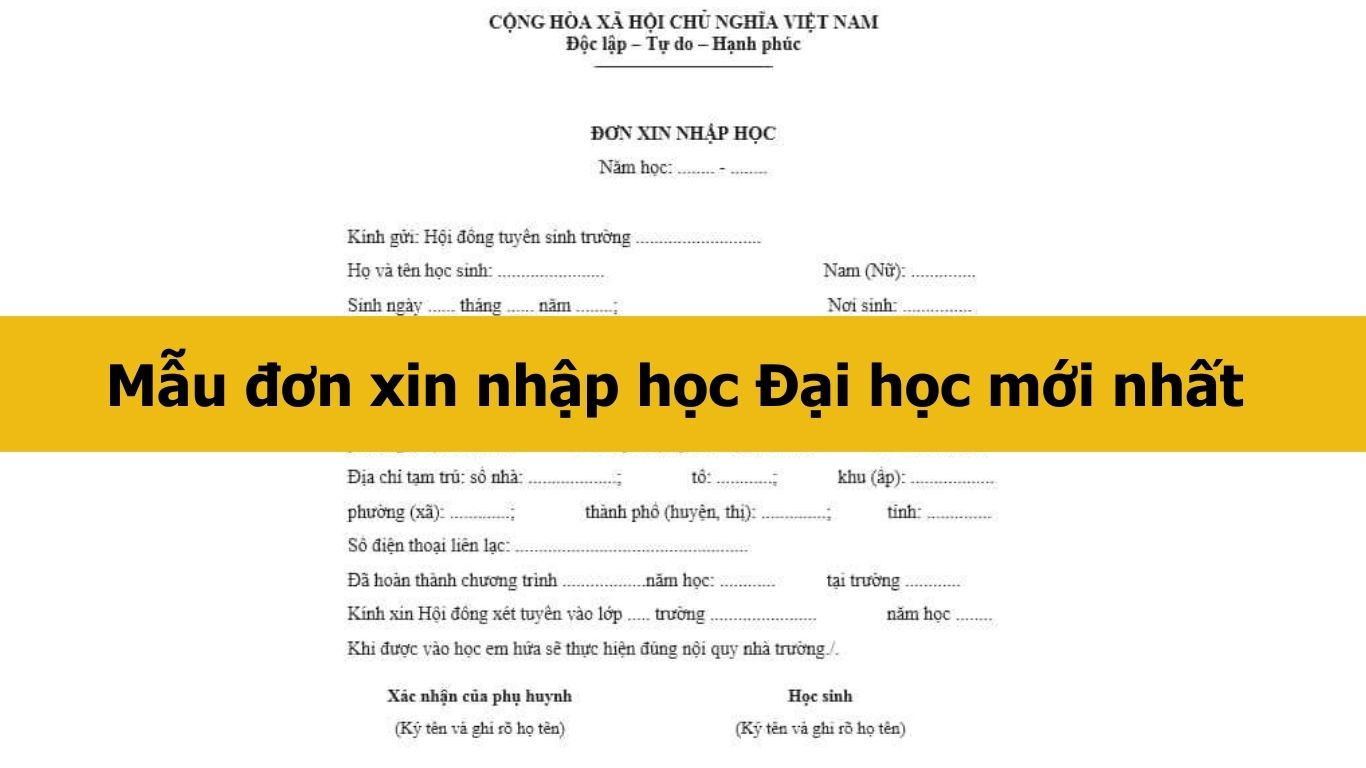
Mẫu đơn xin nhập học Đại học mới nhất 2025
Hiện nay, để chuyển đổi cấp học Đại học trong hệ thống giáo dục Việt Nam thì ngoài các tiêu chuẩn về trình độ, nhận thức còn có một thủ tục trước khi nhập vào cấp học này là phải có đơn xin nhập học. Nhiều phụ huynh còn phân vân chưa biết sử dụng mẫu đơn xin nhập học nào cho đúng. Qua bài viết này, chúng tôi sẽ giúp các bạn có được các mẫu đơn xin nhập học Đại học mới nhất và cách viết phù hợp. 20/01/2025Mẫu đơn xin nhập học THPT mới nhất 2025
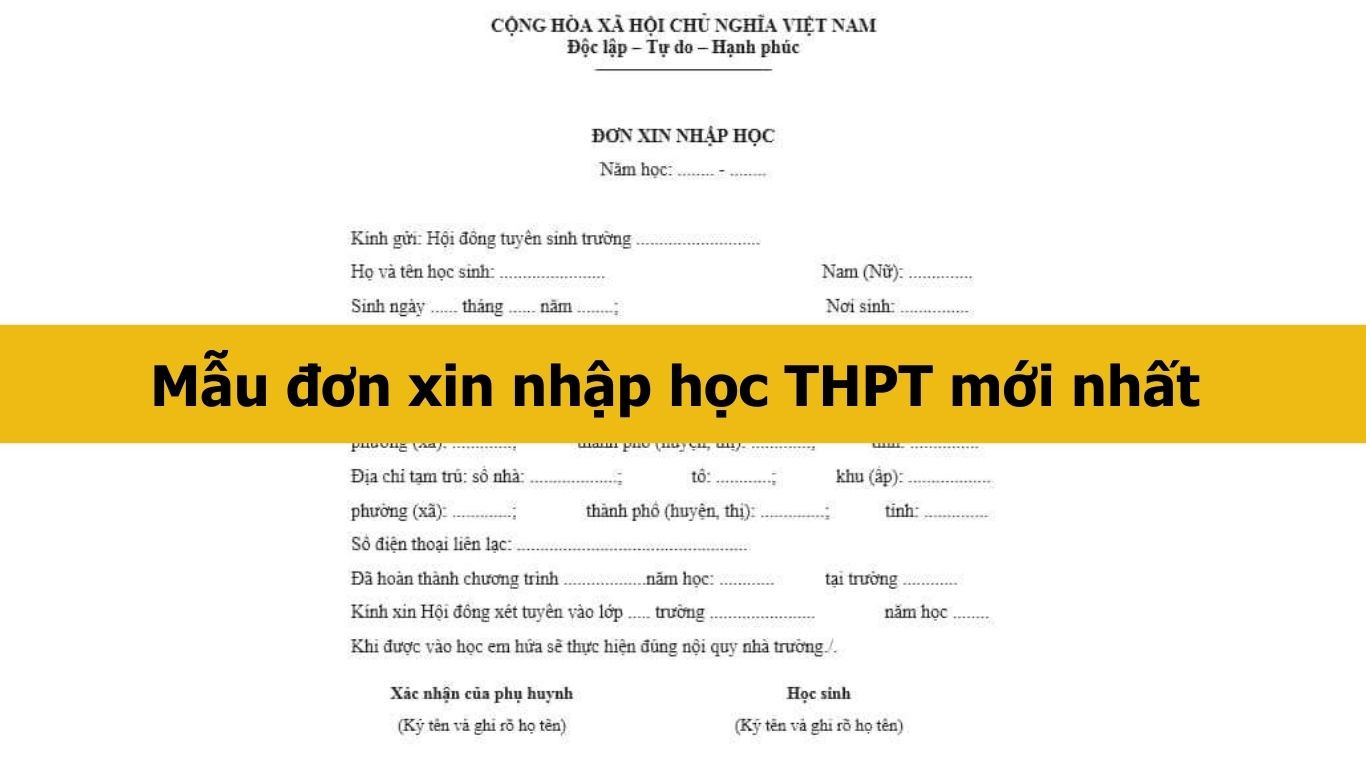
Mẫu đơn xin nhập học THPT mới nhất 2025
Hiện nay, để chuyển đổi cấp học THPT trong hệ thống giáo dục Việt Nam thì ngoài các tiêu chuẩn về trình độ, nhận thức còn có một thủ tục trước khi nhập vào cấp học này là phải có đơn xin nhập học. Nhiều phụ huynh còn phân vân chưa biết sử dụng mẫu đơn xin nhập học nào cho đúng. Qua bài viết này, chúng tôi sẽ giúp các bạn có được các mẫu đơn xin nhập học THPT mới nhất và cách viết phù hợp. 20/01/2025Mẫu đơn xin nhập học THCS mới nhất 2025
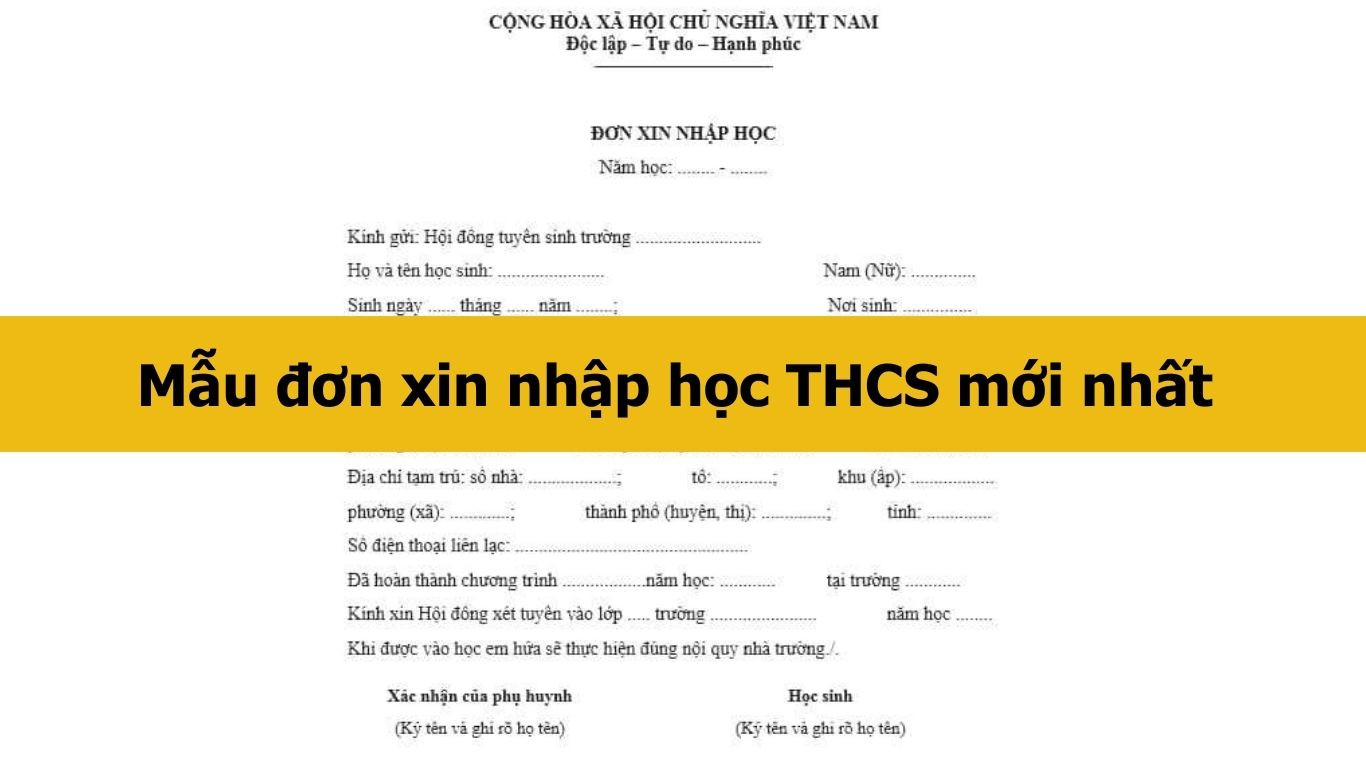
Mẫu đơn xin nhập học THCS mới nhất 2025
Hiện nay, để chuyển đổi cấp học THCS trong hệ thống giáo dục Việt Nam thì ngoài các tiêu chuẩn về trình độ, nhận thức còn có một thủ tục trước khi nhập vào cấp học này là phải có đơn xin nhập học. Nhiều phụ huynh còn phân vân chưa biết sử dụng mẫu đơn xin nhập học nào cho đúng. Qua bài viết này, chúng tôi sẽ giúp các bạn có được các mẫu đơn xin nhập học THCS mới nhất và cách viết phù hợp. 20/01/2025Mẫu đơn xin nhập học tiểu học mới nhất 2025
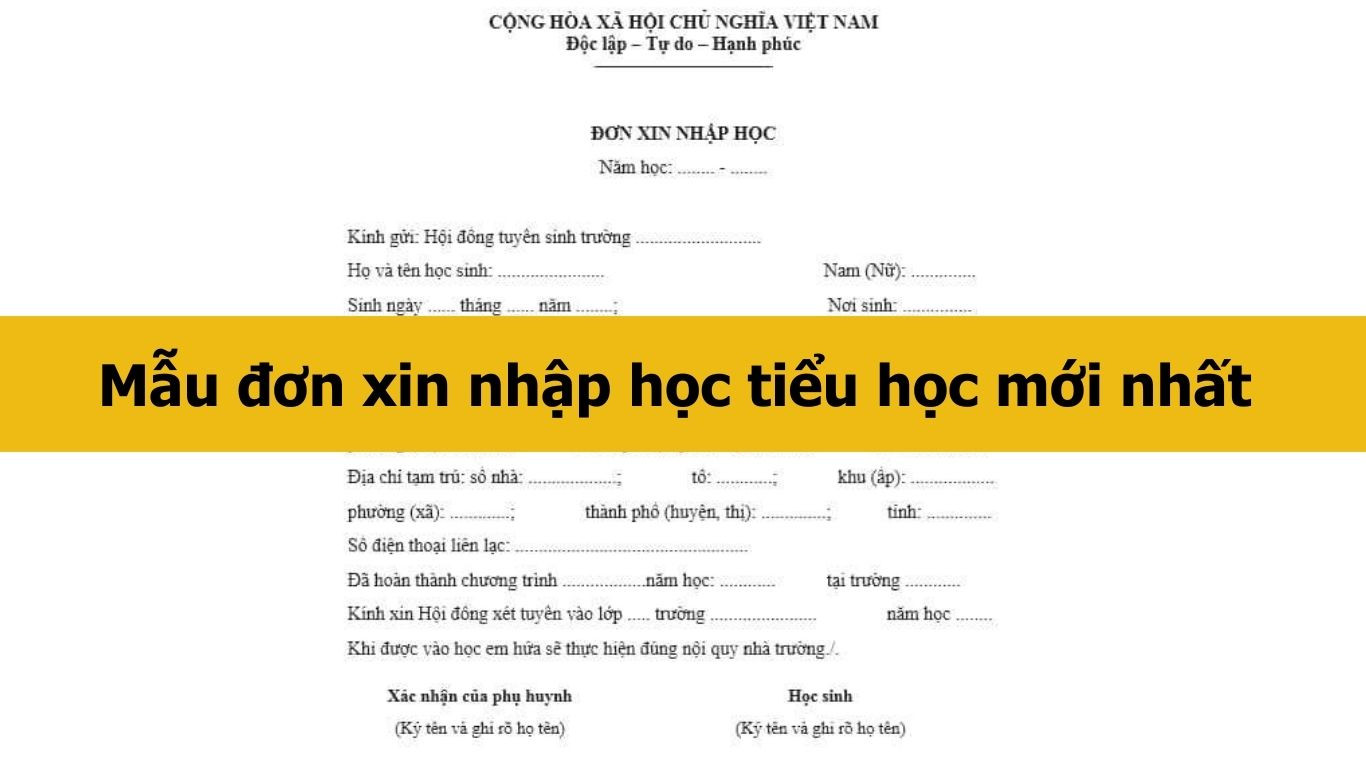
Mẫu đơn xin nhập học tiểu học mới nhất 2025
Hiện nay, để chuyển đổi cấp học tiểu học trong hệ thống giáo dục Việt Nam thì ngoài các tiêu chuẩn về trình độ, nhận thức còn có một thủ tục trước khi nhập vào cấp học này là phải có đơn xin nhập học. Nhiều phụ huynh còn phân vân chưa biết sử dụng mẫu đơn xin nhập học nào cho đúng. Qua bài viết này, chúng tôi sẽ giúp các bạn có được các mẫu đơn xin nhập học tiểu học mới nhất và cách viết phù hợp. 20/01/2025Mẫu đơn xin nhập học mầm non mới nhất 2025 và cách ghi chi tiết
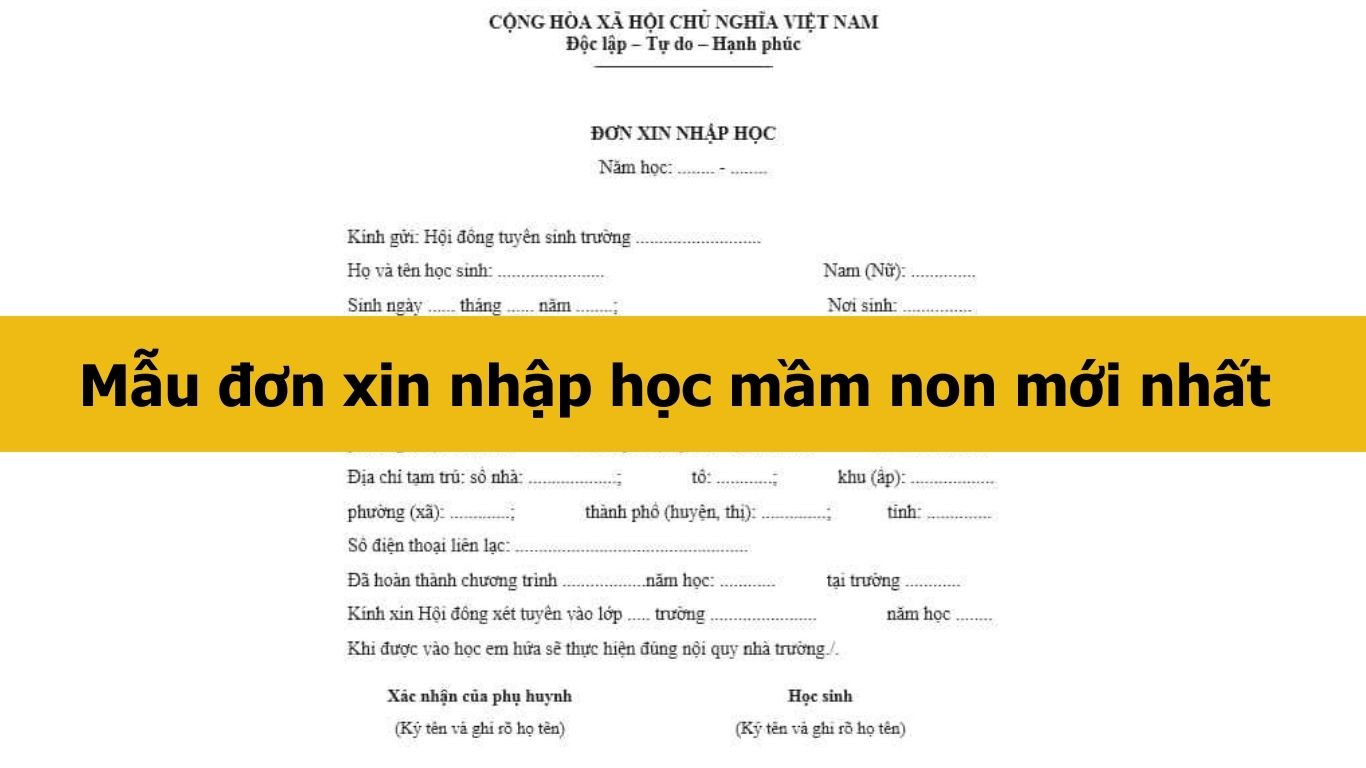
Mẫu đơn xin nhập học mầm non mới nhất 2025 và cách ghi chi tiết
Hiện nay, để chuyển đổi cấp học mầm non trong hệ thống giáo dục Việt Nam thì ngoài các tiêu chuẩn về trình độ, nhận thức còn có một thủ tục trước khi nhập vào cấp học này là phải có đơn xin nhập học. Nhiều phụ huynh còn phân vân chưa biết sử dụng mẫu đơn xin nhập học nào cho đúng. Qua bài viết này, chúng tôi sẽ giúp các bạn có được các mẫu đơn xin nhập học mầm non mới nhất và cách viết phù hợp. 20/01/202503 mẫu đơn xin nhập học mới nhất 2025 và hướng dẫn cách viết
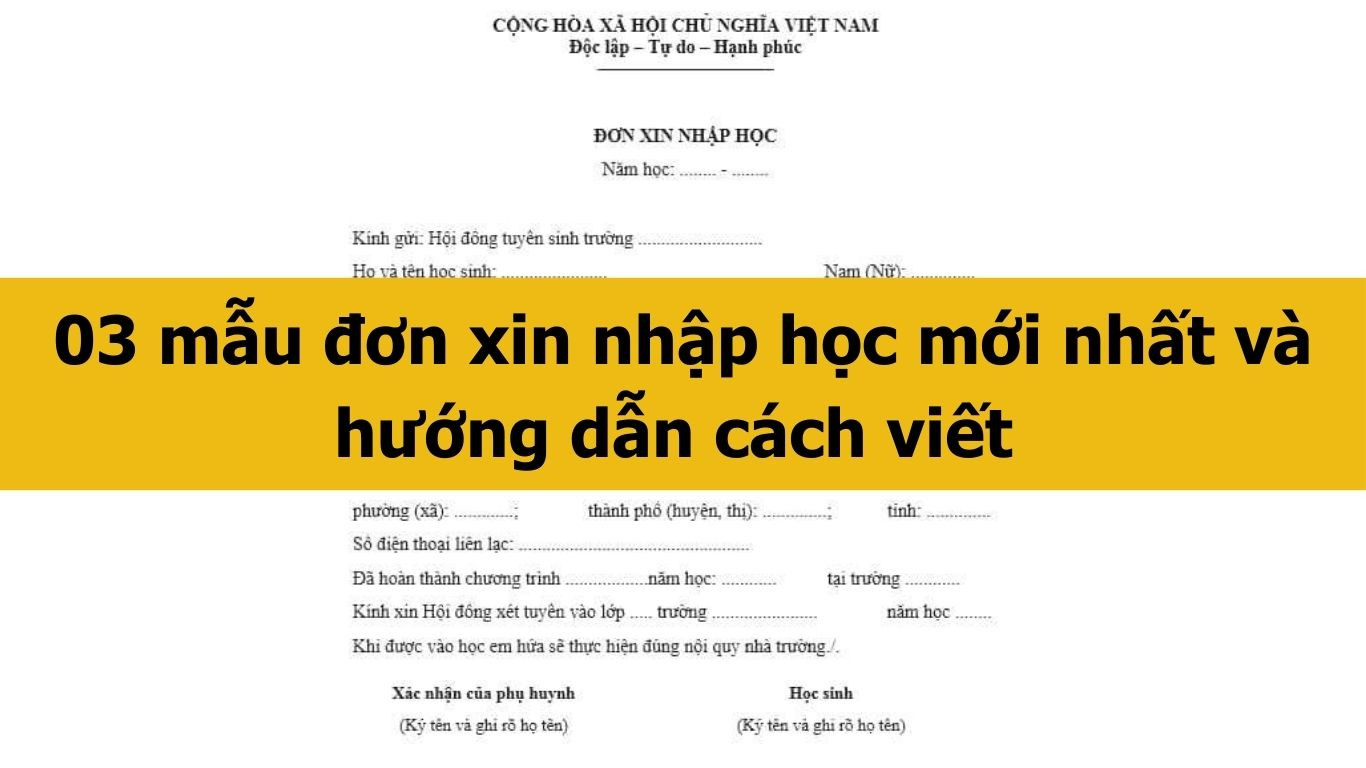
03 mẫu đơn xin nhập học mới nhất 2025 và hướng dẫn cách viết
Hiện nay, để chuyển đổi các cấp học trong hệ thống giáo dục Việt Nam thì ngoài các tiêu chuẩn về trình độ, nhận thức còn có một thủ tục trước khi nhập vào các cấp học là phải có đơn xin nhập học. Nhiều phụ huynh, học sinh còn phân vân chưa biết sử dụng mẫu đơn xin nhập học nào cho đúng. Qua bài viết này, chúng tôi sẽ giúp các bạn có được các mẫu đơn xin nhập học mới nhất và phù hợp. 20/01/2025Các hành vi bị nghiêm cấm với học sinh mới nhất 2025

Các hành vi bị nghiêm cấm với học sinh mới nhất 2025
Bản cam kết học sinh được sử dụng phổ biến trong nhà trường, văn bản này giúp học sinh đặt ra các mục tiêu phấn đấu trong học tập để có động lực cố gắng. Các hành vi bị nghiêm cấm với học sinh mới nhất 2025. Bài viết sau đây sẽ làm rõ về các vấn đề này 14/01/2025Cách viết bản cam kết không tái phạm cho học sinh mới nhất 2025
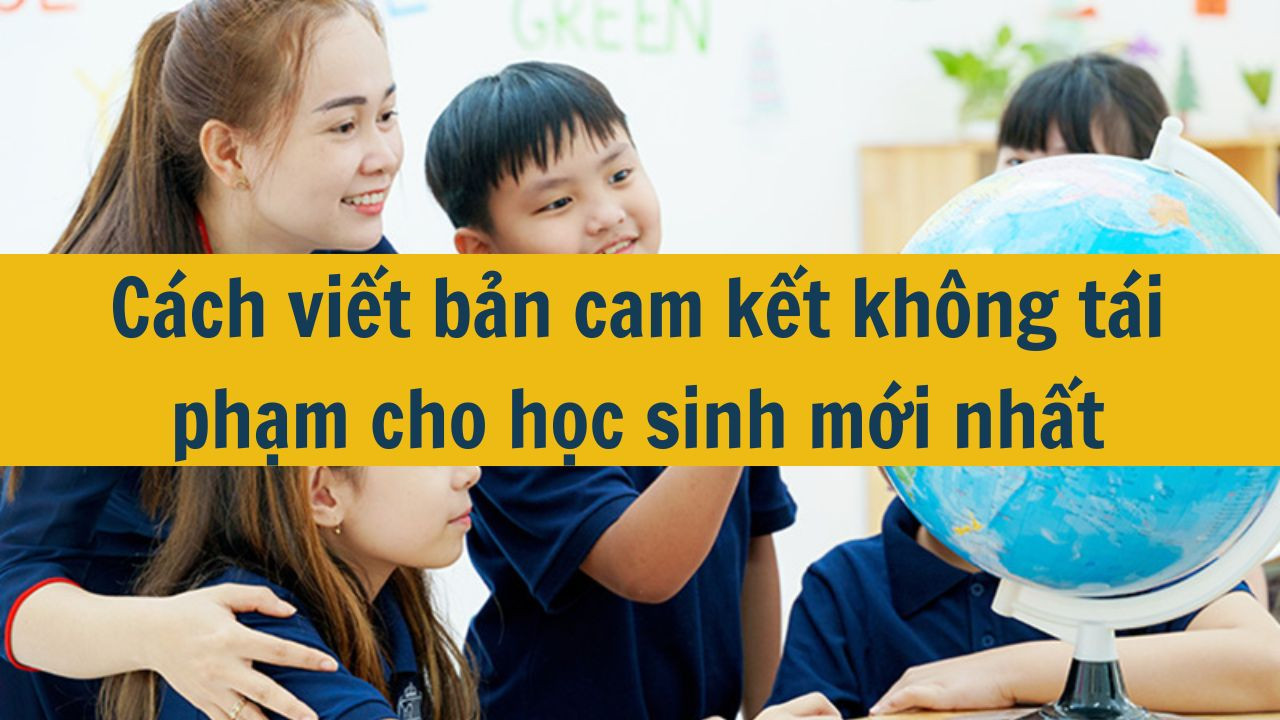
Cách viết bản cam kết không tái phạm cho học sinh mới nhất 2025
Bản cam kết học sinh được sử dụng phổ biến trong nhà trường, văn bản này giúp học sinh đặt ra các mục tiêu phấn đấu trong học tập để có động lực cố gắng. Vậy cách viết bản cam kết không tái phạm cho học sinh mới nhất 2025? Bài viết sau đây sẽ làm rõ về các vấn đề này. 14/01/202505 Mẫu bản cam kết của học sinh mới nhất 2025
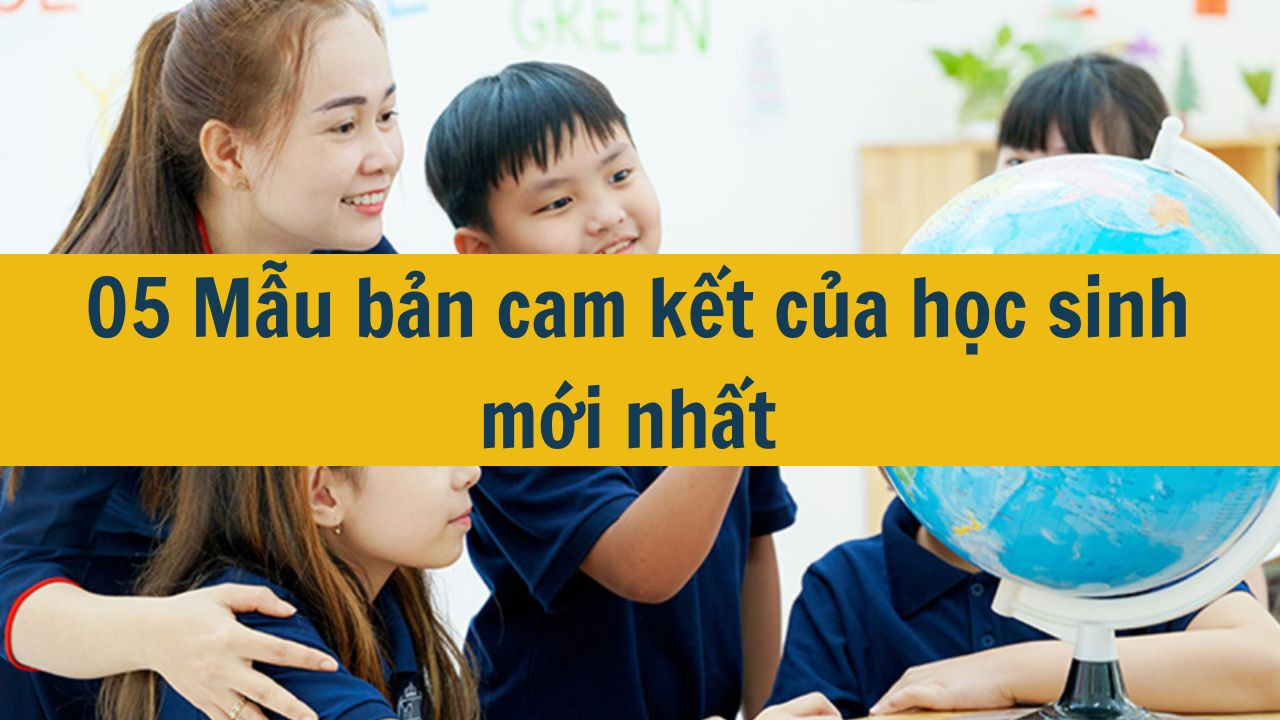
05 Mẫu bản cam kết của học sinh mới nhất 2025
Bản cam kết học sinh được sử dụng phổ biến trong nhà trường, văn bản này giúp học sinh đặt ra các mục tiêu phấn đấu trong học tập để có động lực cố gắng. 05 mẫu bản cam kết của học sinh mới nhất 2025. Bài viết sau đây sẽ làm rõ về các vấn đề này 11/01/2025Năm 2025 học giáo dục thường xuyên có bằng cấp 3 không? Bằng tốt nghiệp giáo dục thường xuyên có giá trị như bằng tốt nghiệp trung học phổ thông không?
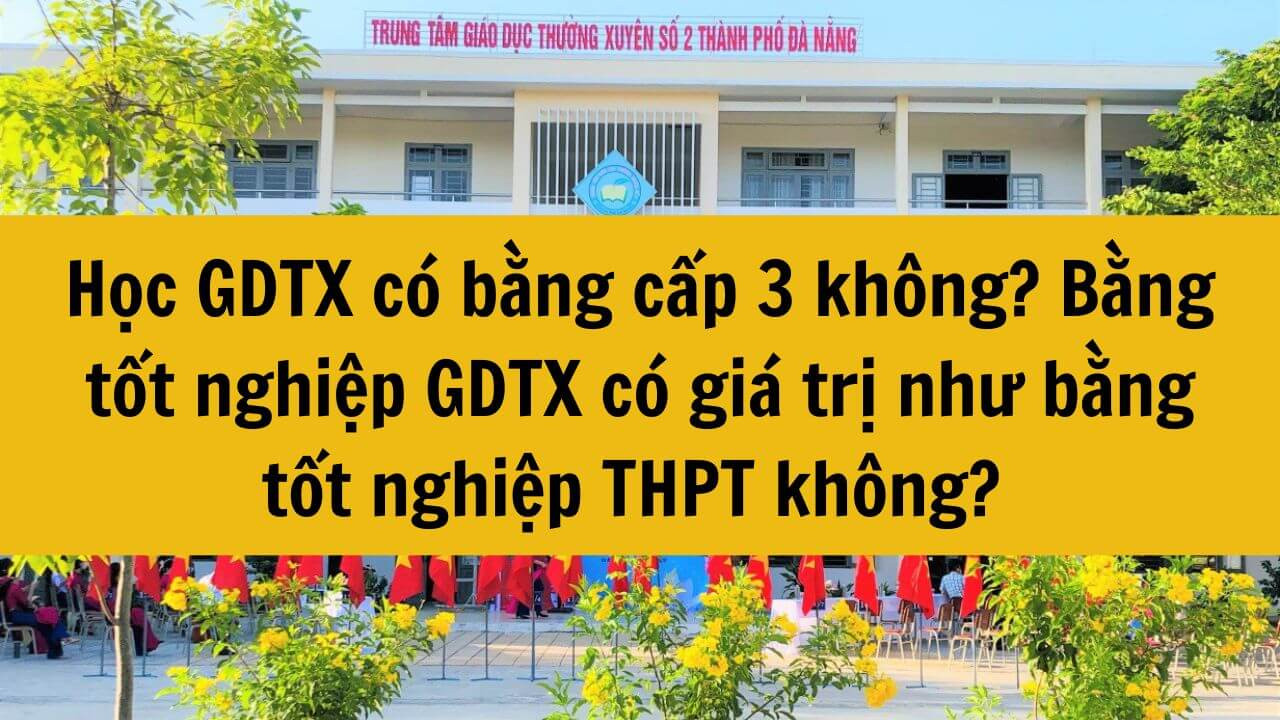

 Luật giáo dục 2019 (Bản Word)
Luật giáo dục 2019 (Bản Word)
 Luật giáo dục 2019 (Bản Pdf)
Luật giáo dục 2019 (Bản Pdf)